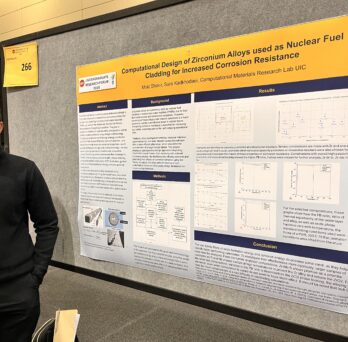Welcome to the CMRL Website!
Physical and mechanical properties of materials and the underlying phenomena in any materials-related process arise from the interaction and structure of basic constituents of matter. Owing to the progress of computer power, numerical simulations have become one of the most fundamental and reliable tools to unravel interactions at the electronic and atomic levels. In the Computational Materials Research Lab (CMRL), our research focuses on developing innovative theoretical and computational frameworks to bridge quantities at the electronic and atomic levels to materials formation, stability, and processes at the macroscopic level. Throughout our research efforts, we discover new materials with desired properties for a wide range of applications and unravel the underlying mechanisms for many materials-related phenomena.

